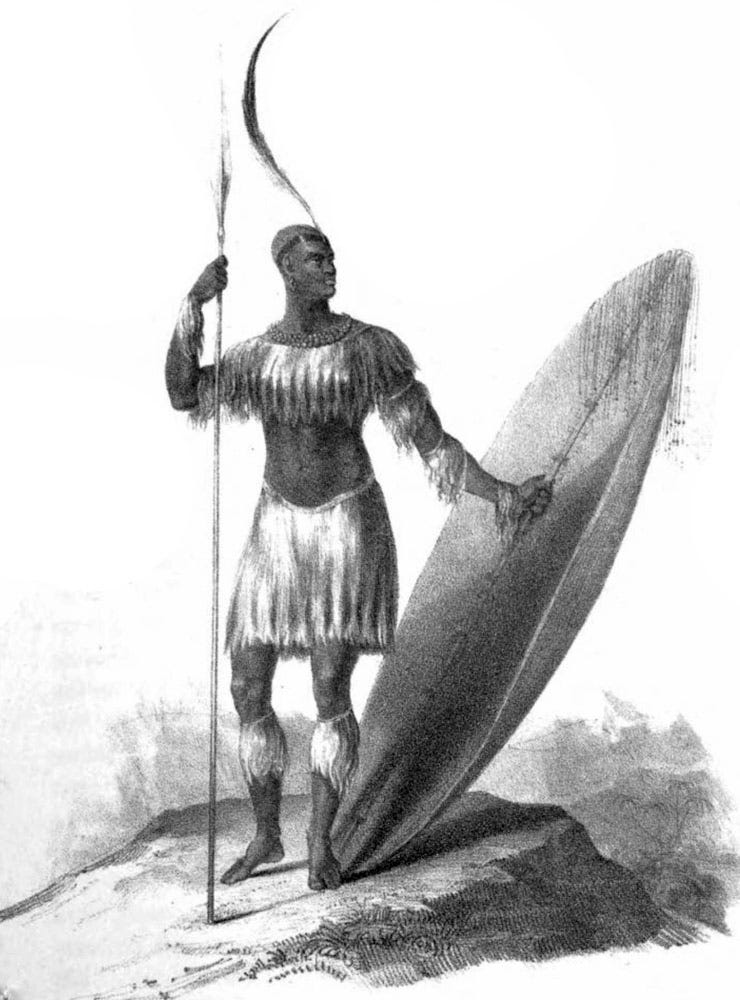Heritage Day at Gaabo Motho
A Journey Through South Africa's Living History
September 24th is Heritage Day in South Africa, a public holiday that honors the nation's rich cultural diversity and complex history. This day serves as a reminder of the importance of preserving and celebrating the various cultures that make up the Rainbow Nation. The holiday has its roots in a Zulu holiday called Shaka Day, which commemorated the legendary Zulu king, Shaka kaSenzangakhona, who played a crucial role in uniting disparate Zulu clans into a cohesive nation in the early 19th century.
King Shaka Zulu
Following King Shaka's death on September 24th, 1828, Shaka Day was celebrated throughout Kwa-Zulu Natal as a way to honor his legacy and their cultural heritage. However, when the post-apartheid government began creating new national holidays, they initially excluded September 24th from the calendar. This omission led to protests from the Zulu community, who sought to preserve the holiday. In response, the government established Heritage Day, broadening its scope to celebrate all of South Africa's diverse cultures while maintaining the historical connection to Shaka Day.
Peace Corps celebrated with a visit to Gaabo Motho, a living history museum that showcases the traditional lifestyles of various South African tribes before colonization. The immersive experience began with a warm welcome from traditional dancers, their vibrant costumes swaying to the rhythmic beating of drums.
The tour wound through a collection of traditional homes, each built in the architectural style of a different ethnic group. From the distinctive round rondavels of the Zulu to the compounds of the Pedi and Tswana, each dwelling told a story of adaptation to environment and cultural values. Inside these homes, cultural demonstrators shared insights into daily life, from cooking methods to sleeping arrangements, bringing history vividly to life.
One of the most fascinating encounters was with the traditional healer, who explained the spiritual and medicinal roles these practitioners play in their communities. The healer demonstrated traditional bone reading, a divination practice deeply rooted in South African spiritual traditions. The cultural experience continued with an opportunity to taste mopane worms, a protein-rich caterpillar considered a delicacy among the Pedi people. The day ended with a drumming lesson and a communal lunch filled with more dancing and celebration.
Mopane worms!
The traditional healers election prediction aged rather poorly…
Behind the joyful celebrations at Gaabo Motho lies a profound mission. The founder shared with us the deeply personal story that inspired her and her husband to create this cultural village. During the apartheid era, her sons attended public schools where they were actively discouraged from speaking Sepedi, their mother tongue. The education system's strict prioritization of English and Afrikaans created an insurmountable barrier between her children and their grandparents, who spoke only Sepedi. This forced linguistic divide effectively cut off an entire generation from their cultural heritage.
The consequences of this language suppression reached far beyond simple communication barriers. Without the ability to speak their native language, younger generations lost access to oral histories, traditional knowledge, and cultural practices that had been passed down for centuries. This systematic erasure of indigenous languages was, in essence, a form of cultural genocide. It was this realization that drove the founder and her husband to establish Gaabo Motho as a sanctuary for indigenous knowledge, language preservation, and intergenerational connection.
Even today, nearly three decades after apartheid's end, significant challenges persist in preserving South African cultural heritage. Young people, increasingly drawn to global pop culture, often show limited interest in their traditional practices. Communities face the complex task of maintaining cultural traditions while adapting to modern life, all while still grappling with the lingering effects of apartheid-era cultural suppression.
This is why Heritage Day and places like Gaabo Motho are so crucial to South Africa's journey of cultural reclamation and national healing. They serve as living bridges between past and present, offering immersive experiences that bring traditional practices to life through dance, music, food, and storytelling. As South Africa continues to forge its path forward, these celebrations of cultural heritage help heal historical wounds while nurturing pride in the diverse traditions that make up the Rainbow Nation.



What a great way to learn more about the cultural history and tradition of the various peoples of South Africa. I loved the drumming and dancing...not sure I would have been brave enough to taste the worm!
Carolyn
Fascinating